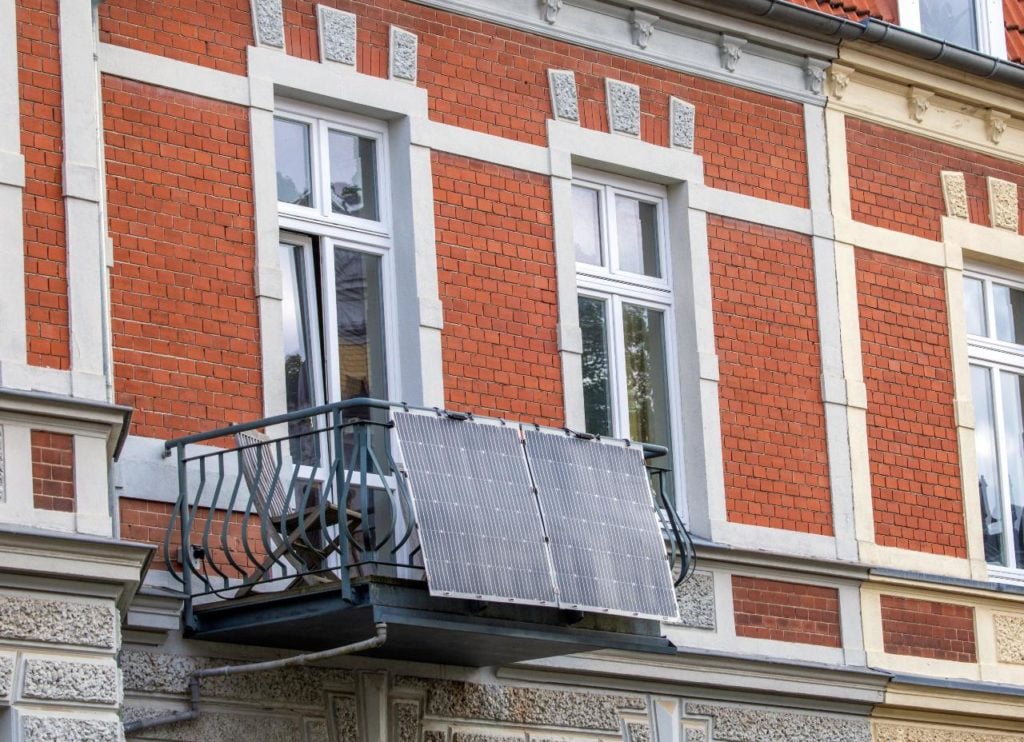On Wednesday, Germany's federal cabinet approved new plans to make it easier for people to install private solar-power systems for their homes.
To help make this possible, the cabinet approved a package of measures, known as Solar Package I, which aims to reduce bureaucratic obstacles to this type of electricity generation. The corresponding law is expected to be discussed in parliament in the autumn and potentially come into effect in early 2024.
What will become easier?
Until now, home solar panel users have had to register their solar kits with the local grid and install a Zweirichtungszähler - a bidirectional metre - which measures both the electricity consumption from the grid and the electricity generated by a solar panel system which is then fed back into the grid.
READ ALSO: Reader Question: Should I install a new gas heater in my German home?
The new reforms will scrap both of these requirements and in future, you'll only need to register your balcony power plant in a database.
Who can install the electricity generator?
Regardless of whether you're a homeowner or a tenant, you can install a solar-power generator on your property or rented home. In some circumstances, a landlord can explicitly forbid the installation of solar panels, but this right looks set to be weakened under the new law, which will aim to strengthen the general right to a mini-solar-powered system.
How does a balcony solar system work?
The home solar modules are usually available as a kit - often called a "Plug and Play", which contains one or two panels, a mounting device and connecting cable and plug.
The panels contain photovoltaic cells that absorb sunlight and generate direct current and an inverter then converts this into alternating current, which is the type of electricity used in homes. The electricity produced can be easily fed into the home grid by being plugged into a normal plug socket.
Household appliances will first consume the free solar power and then, if that's not enough, electricity will be sourced as usual from the electricity provider.
 A solar panel installation on a balcony in Schwerin, Mecklenburg Western-Pomerania. Photo: picture alliance/dpa | Jens Büttner
A solar panel installation on a balcony in Schwerin, Mecklenburg Western-Pomerania. Photo: picture alliance/dpa | Jens BüttnerCan you install solar panels on any balcony?
While you're generally allowed to install your solar panels where you like (as long as their position doesn't interfere with any neighbouring properties), the positioning is crucial for making sure you capture the maximum amount of sunlight.
According to Thorsten Storck, an energy expert at Verivox, the best solar energy output is achieved when "the balcony faces south, the modules are slightly inclined, and no shade falls on the solar panels".
Unfortunately, those with a north-facing balcony who can only install modules vertically will receive less than a third of the potential yield.
Berlin University of Applied Sciences has developed a free solar simulator which calculates easily online whether it's worth installing a solar system on your balcony.
How much electricity does a plug-and-play solar system produce?
Under ideal conditions, a mini power plant installed on a balcony railing, house facade, or in the garden with a capacity of 600 watts can deliver approximately 570 kilowatt-hours (kWh) of electricity annually.
READ ALSO: German government to subsidise up to €30,000 of heating revamp costs
According to an assessment by consumer portal Verivox, this corresponds to a savings of around €228 per year, based on an average kilowatt-hour price of 39.94 cents/kWh.
How much does a home solar panel kit cost?
Currently, the kits cost between €300 and €1,000, but prices can also be higher during periods of increased demand. A standard module produces around 300 kilowatt-hours of electricity per year and manufacturers offer lengthy warranties of up to 25 years.
When making a purchase, it's important to ensure that the device's manufacturer complies with the safety standard of the German Solar Energy Society.
Is it worth renting a solar panel?
According to energy expert Sören Demandt renting a solar system often doesn't make financial sense. While the costs for purchasing and installing one are higher, in the long run, renting can surpass the expenses of a one-time purchase.

Comments